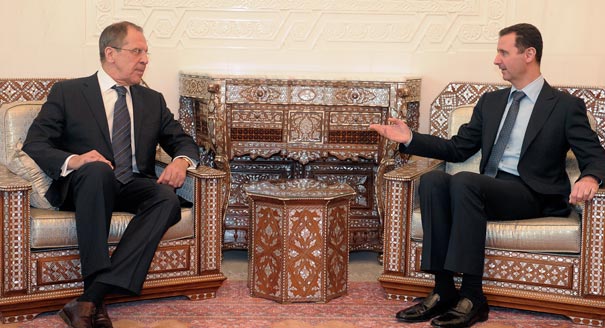When the governments of the United States and Russia began planning for the Geneva II conference on peace in Syria, a simple division of labor was drawn up. The United States would be responsible for bringing the opposition to the table and making it sign any agreement reached, while Russia would deliver the regime of Syrian President Bashar al-Assad.
Despite mobilizing its allies in Europe and the Gulf, Washington’s attempts have only been successful if you settle for the widest possible definition of success. All the most powerful opposition groups have refused to participate in the Geneva talks, and some have even threatened those who said they would. Only after several splits could a faction of exiled rebel politicians in the National Coalition for Syrian Revolutionary and Opposition Forces be brought to the table, with very limited backing from rebel forces inside Syria.
The Assad government showed up with a fairly high-ranking delegation, led by Foreign Minister Walid Muallem, and the Russians appeared to have done their homework. But getting Assad’s government to Geneva was always the easy part since the Syrian president saw other benefits in going there. It could help him regain some lost international legitimacy, and by supporting the conference he helped inflame tension in the opposition camp.
A Strong Russian Role in Syria
A more important question is whether the Russians can get Assad to agree to anything of significance—either at the Geneva II conference, which is set to reconvene on February 10, or at any other future peace meeting.
In a post on his site al-Bab, the Guardian’s former Middle East editor Brian Whitaker raises the question that is only now beginning to be tested in reality: How much influence does Russia really have over Assad?
Up to a point, of course, it has a whole lot. Russian-Syrian relations are strong, rooted in decades of close cooperation. Since 2011, Russia has been one of only two indispensable allies to Assad, the other being Iran. Russia’s military and economic support has helped his regime survive so far, and its vetoes in the United Nations Security Council have helped avert both UN sanctions and U.S. military strikes. Whitaker notes that Russia has in fact moved very skillfully on Syria, successfully acting “as both a wrecker and a facilitator—blocking Security Council resolutions but also assisting in the removal of Syria’s chemical weapons.”
That strategy has paid off handsomely, even as Syria has burned. In the past three years, Russian influence in Syria has swelled dramatically and Moscow has acquired a new hand to play in regional politics. From having been a bit actor in Middle Eastern affairs, clinging to the tattered remains of the Soviet empire, Russia is now in possession of the most powerful client in the region’s most crucial conflict, and Russian President Vladimir Putin is being treated as the leader of a resurrected superpower.
Since strengthening Assad means strengthening Putin, Moscow can be counted on to take Assad’s side on almost every issue—whether it’s starving the rebellious areas of Homs into submission, buying time on the slow-moving dismantlement of chemical weapons, or parading aircraft carriers along the Syrian coast just to remind everyone what an unfortunate idea aerial strikes would be.
What Can Russia Deliver?
But on the truly crucial issues, things may be very different—particularly when it comes to those opposition demands that touch upon Assad’s personal prerogatives and power. The Geneva Communiqué of 2012, a document that emerged from the first round of international peace talks on Syria and on which today’s talks are based, envisions a “transitional governing body” with “full executive powers.” But as the U.S. intelligence community recently concluded in an official assessment, “President Asad remains unwilling to negotiate himself out of power.” (However, the U.S. intelligence community also seems to believe his first name is “Bashir.”)
Could Russia ever hope to deliver real reform in Syria, or even the form of limited regime change that the United States seems to be hoping for, where Assad leaves and the security elite stays?
There is little evidence, and less likelihood, that Russia could force Assad to resign if the Syrian president makes it clear that he would rather bring the regime down with him than leave office. Moscow could weaken him by withdrawing support or allowing intrusive Chapter VII resolutions in the UN Security Council (Chapter VII gives the council the power to restore peace and security through military and nonmilitary action). It could even very likely make Assad’s government collapse. But that’s not where Putin wants to end up, so what leverage does he really have?
There are intermittent hints of tension even in the publicly harmonious Syrian-Russian relationship, and they’ve appeared more often since the Geneva debate opened up. In November 2013, there was the curious sacking of Syria’s Deputy Prime Minister Qadri Jamil, a Russian ally. Weeks later, Raja al-Nasser, a leader within the Russian-backed reformist opposition group known as the National Coordination Body for Democratic Change, was kidnapped by the secret police, just as he was organizing pre-Geneva discussions with Russia’s Deputy Foreign Minister Mikhail Bogdanov. He is still missing. In December, Bogdanov also delivered a rare public rebuke to Assad, saying that the president’s comments about how he might run for reelection “affect the atmosphere and do not make the situation any calmer.”
“Russia can do nothing alone,” said Russian Foreign Minister Sergei Lavrov last week when asked why his government didn’t force Syria to comply on humanitarian demands. “I can assure you that we are putting daily pressure on the Syrian government,” he continued, but “it’s a difficult situation and to try to convince a government that is waging a war to make gestures, this is a very difficult task.”
Indeed it is. And just wait until we get beyond “gestures.”






